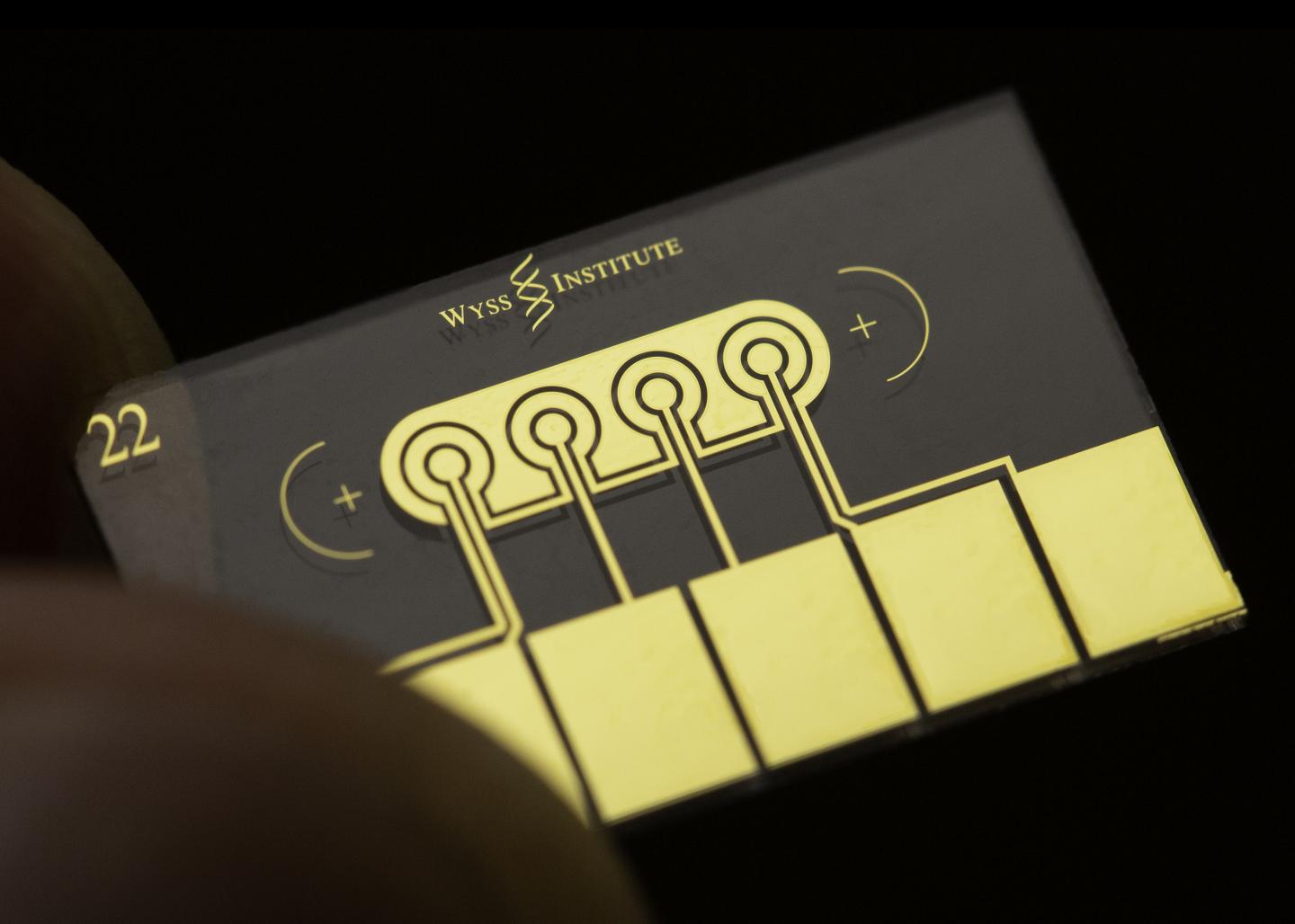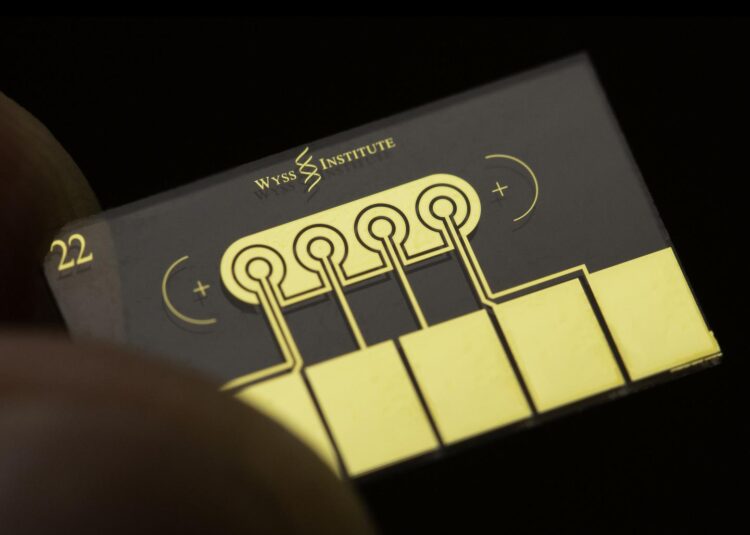Combination of the Wyss’ electrochemical sensing technology with GBS’s transistor technology could enable fast, multiplexed, low-cost COVID-19 biomarker analysis in point-of-care applications.

Credit: Wyss Institute at Harvard University
(BOSTON) — The Wyss Institute for Biologically Inspired Engineering at Harvard University and GBS Inc., a subsidiary of The iQ Group Global, announce that they will collaborate to validate and de-risk a specific and sensitive COVID-19 diagnostic that would integrate the Institute’s eRapid technology with the company’s proprietary transistor sensor technology to enable simultaneous electrochemical sensing of multiple biomarkers related to SARS-CoV-2 infection in point-of-care COVID-19 diagnostic applications.
The research collaboration further cements both parties’ commitment to bringing the Wyss’ multiplexed electrochemical detection system forward as a diagnostic tool during the pandemic, and follows a licensing agreement coordinated by Harvard’s Office of Technology Development (OTD) in November 2020 that granted The iQ Group Global non-exclusive, term-limited access to the eRapid technology in accordance with the University’s commitment to the COVID-19 Technology Access Framework.
“In this relentless pandemic, a diagnostic platform that can rapidly measure multiple COVID-19-related biomarkers at the pharmacy, doctor’s office or even at home in an affordable way would have enormous advantages, and enable us to understand the pathophysiology of the disease as it develops, persists, and is controlled by vaccination and anti-viral therapies,” said Wyss Founding Director Donald Ingber, M.D., Ph.D. “The point-of-care diagnostic we are striving for will hopefully be able to do all this, and in addition potentially provide immediate insight into where in the disease process patients find themselves.” Ingber also is a lead of the Wyss Institute’s Bioinspired Therapeutics and Diagnostics initiative, and the Judah Folkman Professor of Vascular Biology at Harvard Medical School and Boston Children’s Hospital, and Professor of Bioengineering at the Harvard John A. Paulson School of Engineering and Applied Sciences.
eRapid was developed by a cross-disciplinary Wyss team led by Ingber and Wyss Senior Staff Scientist Pawan Jolly, Ph.D. as a low-cost, affinity-based electrochemical sensing platform that can simultaneously detect and quantify of a broad range of biomarkers, with high sensitivity and selectivity, from a small volume of complex biological fluids, such as whole blood or saliva. The team had initially applied the technology for detection of sepsis and other life-threatening diseases; however, motivated by the rapidly spreading pandemic, they are also configuring eRapid as a comprehensive COVID-19 biomarker detection technology.
The eRapid technology uses a novel, low-cost, antifouling nanocomposite coating to which SARS-CoV-2-specific ligands may be attached in order to capture viral proteins or RNA, as well as host antibodies and other proteins produced by infected individuals in response to the virus. Upon chemically detecting any one of these virus-specific molecules, the eRapid platform generates an electrical signal that correlates in strength with the levels of target molecules that are detected. The Wyss team has recently dramatically improved the cost-effectiveness of eRapid by developing a graphene-based surface chemistry that further enhances biomarker detection relative to earlier versions of the coating, and dramatically decreases fabrication costs.
“We feel fortunate to be able to benefit from GBS Inc.’s experience with quality control and their insights into requirements from regulatory agencies. This close working relationship will hopefully provide a significant push towards the commercialization of eRapid as a comprehensive COVID-19 biomarker detection system for use in clinical point-of-care applications,” said Jolly, who has helped to pioneer the eRapid technology.
The collaboration aims to further validate the use of the Wyss Institute’s eRapid technology for SARS-CoV-2 detection and to test it in combination with The iQ Group Global’s biosensor platform that has been developed and is commercialized by GBS Inc. The company’s biosensor technology uses a proprietary Organic Thin Film Transistor technology (OTFT), which can significantly enhance electrical signals such as the ones generated by eRapid. Ultimately, this could enable COVID-19-related biomarker signals to be read out in real time in point-of-care smart devices.
“Incorporating the Wyss’ clever antifouling coating into the OTFT biosensor platform technology offers a new diagnostic tool for COVID-19 that can be printed onto plastic strips at a massive scale, ensuring a rapid test for everyone, everywhere,” said Paul Dastoor, Ph.D., inventor of the OFTF biosensor platform, and Professor at the School of Mathematical and Physical Sciences of The University of Newcastle, Australia.
“The Wyss Institute was a natural and complementary fit for this collaborative research, with their track record of electrochemical sensing technology,” said Dr. George Syrmalis, Ph.D., Group Chief Executive Officer of The iQ Group Global. “With multiple vaccines in the process of being approved and distributed, it is clear that there remains an important need for rapid, point-of-care diagnostic solutions to ensure accurate testing as we fight to curb the coronavirus pandemic for people globally.”
###
PRESS CONTACTS
Wyss Institute for Biologically Inspired Engineering at Harvard University
Benjamin Boettner,
[email protected],
+1 617-432-8232
The iQ Group Global
Australia:
Gemma Garkut,
[email protected]
James Gorman,
[email protected]
The Wyss Institute for Biologically Inspired Engineering at Harvard University uses Nature’s design principles to develop bioinspired materials and devices that will transform medicine and create a more sustainable world. Wyss researchers are developing innovative new engineering solutions for healthcare, energy, architecture, robotics, and manufacturing that are translated into commercial products and therapies through collaborations with clinical investigators, corporate alliances, and formation of new startups. The Wyss Institute creates transformative technological breakthroughs by engaging in high risk research, and crosses disciplinary and institutional barriers, working as an alliance that includes Harvard’s Schools of Medicine, Engineering, Arts & Sciences and Design, and in partnership with Beth Israel Deaconess Medical Center, Brigham and Women’s Hospital, Boston Children’s Hospital, Dana-Farber Cancer Institute, Massachusetts General Hospital, the University of Massachusetts Medical School, Spaulding Rehabilitation Hospital, Boston University, Tufts University, Charité – Universitätsmedizin Berlin, University of Zurich and Massachusetts Institute of Technology. For more information, please visit http://wyss.
Harvard University’s Office of Technology Development (OTD) promotes the public good by fostering innovation and translating new inventions made at Harvard University into useful products that are available and beneficial to society. Our integrated approach to technology development comprises sponsored research and corporate alliances, intellectual property management, and technology commercialization through venture creation and licensing. More than 70 startups have launched to commercialize Harvard technologies in the past 5 years, collectively raising more than $2.5 billion in financing. To further bridge the academic-industry development gap, Harvard OTD manages the Blavatnik Biomedical Accelerator and the Physical Sciences & Engineering Accelerator. For more information, please visit https:/
The iQ Group Global is a consortium of companies that find, fund and develop bioscience discoveries to create life-changing medical innovations. The Group provides a turnkey solution for bioscience companies, spanning corporate advisory and investment banking, through to research, development, and commercialization of life science assets.
http://www.
Media Contact
Benjamin Boettner
[email protected]





